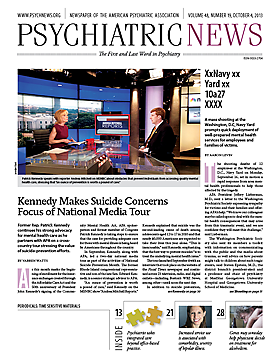We want to bring to your attention an apparent discrepancy between the text of DSM-5 and the self-exam questions on trauma and stress-related disorders published in Psychiatric News August 15.
The self-exam presents a case “best described as adjustment disorder with prolonged, chronic bereavement.” We have two concerns with this. The first is the introduction of new terminology (“prolonged, chronic bereavement”) to describe the phenomenon. The second is its placement as an adjustment disorder.
Importantly, in DSM-5 persistent complex bereavement disorder is not included in the section for “Adjustment Disorders” (Box 19-5, 309.0/2/3/4/9; F43.20-25). Rather it is included in the section “Criteria for Other Specified Trauma- and Stressor-Related Disorders” (Box 19-7, 309.89, F43.8) as an example: 5. Persistent complex bereavement disorder….
Additionally, provisional criteria for this condition are contained in Section 3 as a “condition requiring further research.”
We are concerned that the discrepancy between the self-exam question and the DSM-5 text will be confusing at best and that it may impede the types of research called for in the DSM. We ask that this letter be published and attached electronically to the file containing the exam.
M. KATHERINE SHEAR, M.D.CHARLES REYNOLDS, M.D.BARRY LEBOWITZ, PH.D.NAOMI SIMON, M.D.SIDNEY ZISOOK, M.D.DARREL REGIER, M.D., M.P.H.
Editor’s note: The Web version of the DSM-5 self-exam question was updated as soon as the error was discovered.
Response from Philip Muskin, M.D., a professor of clinical psychiatry at Columbia University, under whose leadership the DSM-5 self-exam questions are developed:
We would like to thank Dr. Shear and her colleagues for pointing out the error in the question on the self-exam. The question and the corrected answer are as follows:
Two years after the death of her husband, a 70-year-old woman is seen for complaints of sadness, anger regarding her husband’s unexpected death after a heart attack, a yearning for him to come back, and unsuccessful attempts to move out of her large home because of her inability to remove his belongings. Which diagnosis would best fit this patient?
a) major depressive disorderb) posttraumatic stress disorderc) other specified trauma- and stressor-related disorder with the specification of persistent complex bereavement disorderd) personality disordere) normative stress reaction
Correct Answer: C. other specified trauma—and stressor-related disorder with the specification of persistent complex bereavement disorder
Rationale: This patient does not fall into any discrete diagnosis within the trauma- and stressor-related disorder category and should be diagnosed with the “other” designation. At least 12 months following the death of a close relative or friend, the individual experiences intense yearning or longing for the deceased, intense sorrow and emotional pain, or preoccupation with the deceased or the circumstances of the death. The person may also display difficulty accepting the death, intense anger over the loss, a diminished sense of self, a feeling that life is empty, or difficulty planning for the future or engaging in activities or relationships. The clinician may choose to communicate the specific reason that the presentation does not meet specific criteria by recording “other” followed by the specific reason. In this case the reason would be persistent complex bereavement disorder. (Provisional criteria for this diagnosis are in the chapter “Conditions for Further Study.”) Mourning shows substantial cultural variation; the bereavement reaction must be out of proportion or inconsistent with cultural or religious norms. ■
